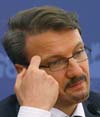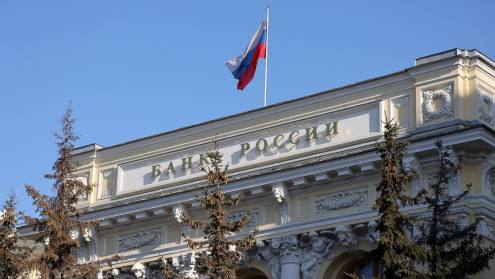Russia plans to launch a series of state-backed venture capital funds in the coming months as part of the Kremlin’s effort to revive the intellectual might that made the Soviet Union a superpower.
President Vladimir Putin has personally spearheaded the effort and told government officials at the end of last year “create a venture fund, any fund, just do it quickly”.
He set off a storm of activity in the Kremlin as bureaucrats scrambled to find out exactly what a venture capital fund was. The project was formally announced in January and since then the government has roped in industry professionals to make sure that the $800m that the Kremlin has earmarked for the effort is not squandered.
The first of the funds, a regional Moscow fund, went into operation in October as it began to accept applications from projects. Kremlin officials have done their homework and Kirill Dmitriev, chairman of the Russian Private Equity and Venture Capital Fund Association, says he has been in high demand recently. “Venture capital is in its infancy, but there is a lot of excitement over the government programme which could be a great help,” he says.
Two goals
Behind the drive are two goals. The first is to boost investment, which is Russia’s biggest Achilles heel. While the state’s coffers have been flowing over with windfall oil revenues and growth is high, the growth in fixed investment has been running at about 10% a year. That is far less than the 15% that economists says is needed to meet Mr Putin’s target of doubling gross domestic product (GDP) by 2010, and even further from the 20%-25% needed to finance an Asian Tiger-style transformation.
The second goal is the hope that by providing significant seed capital, the Kremlin can kick-start an industry that is all but non-existent in Russia and so catalyse the growth of the country’s high-tech industry. A venture capital industry will also catalyse the process of improving legislation to protect intellectual property and the legal infrastructure that surrounds service-based industries.
Mr Dmitriev has been active in bringing together Western venture capitalists with top government officials, who met minister of science and technology Andrei Fursenko and Russia’s economic guru, minister of economic development and trade German Gref, in September to explain what they need to make venture capital funds work.
|
| German Gref, the Russian Federation’s minister of economic development and trade |
“What Mr Gref is trying to figure out now is if venture capital can be used to transform the Russian economy,” says Mr Dmitriev.
Growing up
Russian venture capital is still in its infancy but was already starting to grow before Mr Putin singled it out for special attention this year. Mr Dmitriev estimates the amount invested into traditional early stage ventures will reach $200m this year, up from $140m last year. But he says that since the Kremlin has pushed venture capital funds to the top of the agenda, he expects it to turn into a $3bn business within three years.
So far, virtually none of Russia’s venture capital money has come from dedicated venture capital funds that are systematically looking for big returns from small companies at a very early stage of development. Most venture capital is by big domestic companies investing into new technologies on the fringe of their main research and development (R&D) projects. For example, Norilsk Nickel has been funding research into hydrogen cells, and oil company Yukos backed studies into ways to change gas into oil.
The small number of private equity firms working in Russia also dabble in start-ups but most of the venture money is invested by oligarchs or ‘minigarchs’ – businessmen who have made $100m or so and are backing small projects as much for fun as for the return.
High demand
“There are a lot more projects than there are venture capital funds and almost no-one was looking at start-ups a few years ago. It is a fund manager’s market and they are spoiled for choice,” says Viktor Frumkin, co-director of Bridgetown Foods, which makes croutons (a popular Russian snack food) and eventually went into business after raising money from the leading private equity fund Baring Vostok Partners several years ago.
Even so, the Cold War legacy means that Russia still boasts world-class scientists and there have already been several successes: the Russian company Paragraph is a world leader in technology to read handwriting; and AB software has produced some of the best software for optical character recognition. What the Kremlin is betting on is that Russian scientists have a lot more good ideas that they cannot put on the market because they have no access to capital.
Venture capitalism is a new idea in Russia. The problem is not that Russian science is not an eligible candidate for venture capital – it is – but that there is more opportunity than money in Russia’s increasingly vibrant economy. “The main problem for Russian venture capitalism is you can still get much better returns from private equity investments. Why take on the technology risks if you can still earn 80%-90% a year from more certain private equity investments?” says Mr Dmitriev.
Mint Capital is probably the first true venture capital firm to set up in Russia, focusing on high-tech start-ups in 2000 with $21m under management. And the biggest Russian venture capitalist fund is probably Alfa Group’s Russkiye Tekhnologii (Russia Technologies), which teamed up with the Israeli Infinity Venture Capital to form RT-Infinity Venture Partners in July to look for opportunities in Russian high-tech start-ups and small firms.
Russkiye Tekhnologii has only been in existence for three years and looked at 500 projects in the high-tech sector but invested into only eight projects. However, it sports a rare example of a Russian technological development that has been turned into a commercial project when it began exporting a new, highly efficient motor to India for use in mopeds.
State venture capital
Even the biggest Russian venture funds are minnows by international standards. At the start of this year, Mr Putin launched a drive to create the Russian Venture Company (RVC), which will use some of the billions in oil windfall revenue to finance a series of venture capital funds and give a leg up to entrepreneurs working the high-tech sector.
The RVC is the third major fund set up by the Russian government in the past two years. Rather than start from scratch, the Kremlin decided to base the fund on the assets of Construction Division 1 of the Federal Atomic Energy Agency.
After the fall of the Soviet Union, Russia’s well-financed defence-oriented programmes collapsed. Most of Russia’s scientists were employed in the military-industrial complex and, although the country still has a lot of gifted and experienced scientists, there is a total lack of market mechanisms to identify promising projects and provide them with capital to bring products to the market.
“The RVC will become a fund of funds which will accumulate Rbs15bn ($560m). Up to Rbs5bn will be allocated to the company this year, up to Rbs10bn will be allocated (to the company) in 2007,” Mr Gref said in August. “We aim to attract more than Rbs30bn to the Russian high-tech sector by the end of 2007.”
Flagship fund
A series of venture capital funds are being set up. The VCR is the flagship and will be run on a fund of funds basis – Mr Gref will oversee the creation of about 10 funds with $50m of state money in each. The government will contribute 49% of the capital with the remaining 51% being raised from private investors. As it is in the minority, the government plays no role in the investment decision-making process. Professional fund managers under the supervision of independent directors will manage each fund.
“Venture capital investment can only be done with the participation of the private sector. The fewer the bureaucrats that get involved, the better,” Mr Gref says.
The private managers are the key to the success of the venture. All of Russia’s asset management companies have been vying for the job of managing a fund, and the Kremlin has whittled the list down to about a dozen well-known names. The final decision will be made this autumn and they will be paid 2% of the portfolio they manage as a fee as well as 20% of returns they make.
Other state funds
While market participants welcome the RVC plan as optimal, they are less happy with the state’s telecoms fund. Set up in parallel with the RVC, the ministry of telecoms under Leonid Reiman will be allocated another $300m that it can invest directly into companies working in the telecoms sector.
“The point of the RVC’s fund of funds structure is to remove bureaucrats from the investment decision process. Not only are they, by definition, the worst people to make this sort of decision, you also lay yourself open to the problems of vested interests and corruption. The structure of the telcom fund is fundamentally flawed,” says a Western banker involved in the talks.
Mr Reiman has been dogged by allegations that he is following self-serving policies, and has been accused of being the ultimate beneficial owner of Russia’s third largest mobile phone company, Megafon, during a money laundering probe by German investigators earlier this year, an accusation he has always stringently denied.
In addition to the federal funds, the first regional venture capital fund has already appeared. At the start of October, the Moscow Venture Fund began to accept financing applications from projects.
Managed by Alliance Rosno Asset Management, which is part of an insurance group controlled by the Alfa Group, the fund received its first tranche of Rbs2bn in financing from the state in the summer. In the first tranche, the federal government will contribute Rbs200m, the Moscow city government another Rbs200m and the remaining Rbs400m is being invested by private investors.
Rosno has set the minimum investment into a project at Rbs10m and the maximum at Rbs120m. It hopes these projects will return at least 30% each. The company says that 75% of assets will go into early stage projects, with 15% invested into companies that have just started work and the remaining 10% for small companies that want to expand.
Other funds have also been registered by the Federal Service for Financial Markets in Tatarstan, the Perm and Krasnoyarsk Krai, and the Tomsk region, which are supposed get some money by the end of the year.












